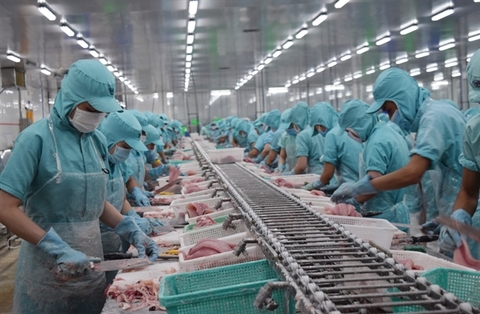 |
|
Processing tra fish at a seafood company in Dong Thap Province. Many local seafood exporters have enjoyed zero anti-dumping tariffs when exporting to the US market.
|
The ministry reported as of September this year, about 200 cases of trade remedies were implemented on Viet Nam’s exports. Of which, there were 32 cases in the first nine months of this year, doubling the number in the whole of 2019.
These cases were mainly for metals (aluminium, flat steel bars and steel pipes), fibres, seafood (shrimp and fish), plywood, construction materials (bricks, glass and sanitary ware), and chemical products.
Foreign countries and territories that have regularly implemented trade remedy investigations on Viet Nam's exports include the US, India, the EU, Turkey, Canada and Australia. These countries make up 62 per cent of the total 200 trade remedy cases on Viet Nam's exports. In recent years, ASEAN countries have also started investigations to apply trade remedies on Vietnamese products, with 38 cases, accounting for about 20 per cent.
Therefore, the ministry has promoted support for manufacturing industries and export enterprises to respond to the trade remedy lawsuits. These ensure their legitimate rights and interests in international trade activities and contribute to reaching the export growth target.
The ministry has regularly updated the list of goods that are at risk of trade remedies and origin fraud measures. It has helped state management agencies strengthen supervision and implement suitable measures.
It has recommended local businesses actively develop plans for production and business, and handling trade remedy lawsuits, while it has provided up-to-date information about the cases.
When a trade remedy case for a Vietnamese product is initiated, the ministry has offered support relating to the case for businesses, especially legal issues.
At the same time, it has coordinated with relevant ministries, sectors and provincial people's committees on investigation questionnaires as measures to support local enterprises in the lawsuits.
With these efforts, according to the ministry, Viet Nam has witnessed success in many trade remedy lawsuits, meaning tax was not imposed or trade defence measures were halted in 65 cases.
Many products, such as seafood, steel, and wood, face trade defence measures but many businesses enjoy zero or very low tax rates to help them maintain and grow exports, especially to major markets such as the US, EU and Canada.
The ministry has recommended that to minimise negative impacts of trade remedies, the manufacturing and export industries and Vietnamese enterprises need to diversify their markets and improve competition in terms of quality. The businesses also need to consider trade remedies part of their production and business strategy, especially export activities.
The enterprises must have basic knowledge of regulations on trade remedies and monitor the Ministry of Industry and Trade’s information about this issue when exporting their products to other countries. They must strictly comply with the rules of origin certification. — VNS

Vietnamese goods face tough road to foreign markets due to trade remedies
With an array of free trade agreements (FTAs) inked and coming into force, countries around the world have also increased technical barriers to protect their domestic industries,